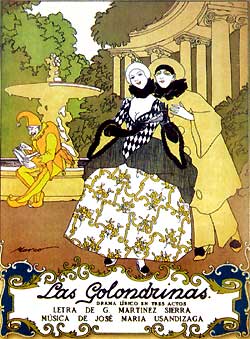 NEW HISTORICAL
ISSUES
NEW HISTORICAL
ISSUESLas Golondrinas -
r.1929
Carlo Galeffi (Puck) - Fidela
Campiña (Lina)
Mercedes Plantada (Cecilia) - Augusto
Gonzalo (Roberto)
Coros y Orchestra del Gran Teatro del Liceo de
Barcelona
c. Antonio Capdevila
(1) Homokord
HOM10217
(2) Blue Moon Serie Lírica
7529
 |
Las golondrinas ("The Wanderers") is the Pagliacci of Spanish opera, a turbulent verismo tragedy centred on a trio of wandering players. It is also the magnum opus of the Basque José María Usandizaga, who died a year after its 1914 premiere, well before his 30th birthday. Gregorio Martínez Sierra's libretto, based on his own play Saltimbanquis ("Mountebanks") is pretty squarely indebted to the Italian work, though his three main characters are more subtle creations than Canio, Nedda and the rest. |
Usandizaga's score has an intensity, a thematic and emotional cogency missing from Leoncavallo's more blatantly tuneful potboiler. Little wonder Las golondrinas swiftly became a classic of the Spanish repertoire, a treasured icon of its young composer's own demise.
Though it started life as a 3-act zarzuela, in 1929 the composer's brother Ramón made the through-written version that has been more popular since. Later that year Las golondrinas became the first Spanish opera to be substantially recorded using the new electrical method. It was made with Barcelona forces under Antonio Capdevila, and the detailed amplitude of the Odeón recording still communicates most forcefully. Barcelona was clearly the place to be, technologically as well as musically, in those few, precious years before the Civil War.
Frankly, wonder at the sonic fidelity is tempered by mild disappointment with the performance itself. Star Italian baritone Carlo Galeffi, a leading Rigoletto of the day, was drafted in to play the fatal clown Puck, but though he had performed the role on stage his histrionic and verbal input is often generalised, the voice sometimes effortful and occasionally flat. There's no arguing with this velvet-smooth, evenly-tempered tone, but Galeffi's performance - unlike his Pablo in the slightly later Maruxa - is uninvolving, tasteful even to a fault.
Fidela Campiña's Lina is strenuous. Her voice was simply too heavy for this hopeful young heroine. At a multitude of points she is unwieldy where delicacy is needed - and delivered by later interpreters such as Pilar Lorengar and Josephine Cubeiro. The flower-fresh meadow of Lina's Romanza de la primavera becomes a muddy obstacle course to show off Campiña's substantially operatic weight of tone, and her reading remains obstinately earthbound.
| The smoky mezzo of Mercedes Plantada has much less to
do, but makes a convincing character of Cecilia, the luckless femme fatale
whose boredom with peripatetic life and the insistent Puck will finally goad
him to murder. The Liceu Chorus acquits itself well, but conductor and
orchestra are the stars of the set. Capdevila's tempi are broad, but finely
sustained, and he never lets the emotional temperature drop until the gentle
Intermedio before the last act. This is the heart of the set, a
poetically gauged eye of the storm - though the famous orchestral
Pantomima isn't far behind, with Galeffi's pivotal Pierrot Song the
vocal highlight, musically phrased and effortlessly lyrical. |
|
By the customary Law of Sod, not one but two CD transfers have just popped up. From Barcelona itself comes the Blue Moon reissue, no 29 in its indispensable zarzuela series. The rival comes from Fonotrón / Homokord of Seville, another small company to whom zarzuelists owe grateful allegiance. Both provide photos of the singers, Spanish libretto and synopsis, but Blue Moon throw in valuable essays, and significantly better documentation of the 1929 recording itself. Homokord give only the release year (1930) without further explanation.
Both transfers are very acceptable. Blue Moon's bright house style presents the voices with marginally greater clarity. Arturo Gil's Homokord transfer comes across as a careful labour of love, with warmer body and less edge, and in a work so perilously close to the edge itself perhaps offers greater pleasure for the full-length listen. A finely balanced choice, but if pushed I'd choose Homokord's more comfortable sound over Blue Moon's fuller notes.
© Christopher Webber 2000
Las Golondrinas -
synopsis
Fonotron-Homokord online order page
CD
Review index
